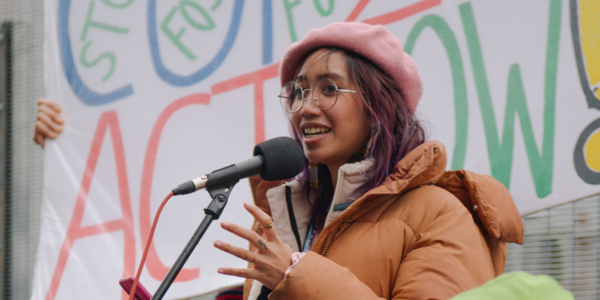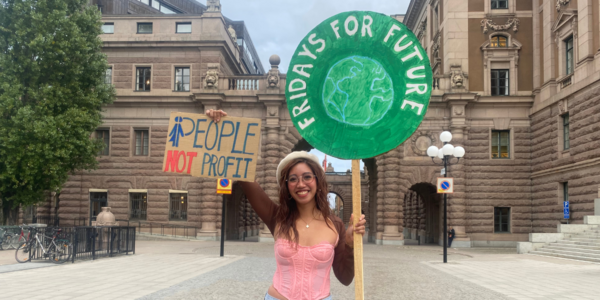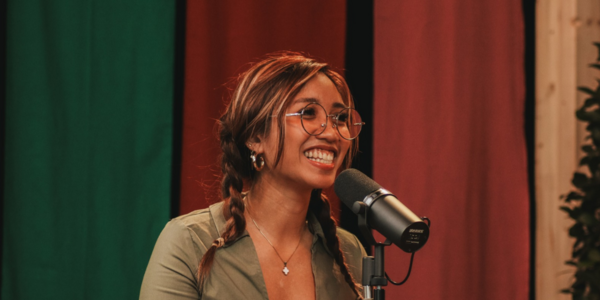Learning from the Global South
Filipina climate activist Mitzi Jonelle Tan is campaigning for the voices of the Global South to be heard in the fight against the climate crisis. In an interview with Michaela Wengler and Hanna Stepanik from the VIDC's fairplay initiative, she also explains why climate activism needs more feminism.
fairplay initiative
You describe yourself as an anti-imperialist climate activist. What does that mean to you?
Mitzi
I witnessed the impact of the climate crisis on my community early on. We are one of the countries most affected by climate change in the world. And yet many of us don't know what the term climate change really means, because the climate education we receive is very foreign, very western, very technical, very alienated. And it's not about what we actually experience as a community, as a country.
That's how my activism for climate justice came about, which was linked to anti-imperialism from the very beginning. It's about understanding that the climate crisis cannot be seen separately from its origin, which is imperialism, which has led to the industrial revolution and the countries of the Global North increasing their emissions and extracting the resources of our countries and our peoples. It is this cycle that has made us so vulnerable to the effects of the climate crisis and which has forced us to experience this crisis in the first place.
fairplay initiative
As an activist, what do you think of the UN's Sustainable Development Goals (SDGs)?
Mitzi
I think the SDGs are good goals, but they are just goals. There are no concrete action steps and plans on how to achieve them, and that's where governments and civil society come in. So the SDGs don't achieve much as such, but they achieve a lot by ensuring that people understand the direction we should be going in, that we can actually demand the eradication of poverty, we can fight for clean water, clean air. The SDGs are effective when governments really take them to heart and do something about them. But most current governments around the world, especially those in the Global North, who are the main perpetrators of the climate crisis and all the other socio-economic crises we are experiencing today, may talk about a goal and maybe even adopt some measures, but do they actually implement them? I don't think so.
https://www.fairplay.or.at/en/archive/learning-from-the-global-south#top
fairplay initiative
You once mentioned that activism is a taboo word in the Philippines. Why is that?
Mitzi
In the Philippines, the government tends to label activists as terrorists. In the recent past, there was the case of two young activists, Jhed Tamano and Jonila Castro, who fought against so-called land reclamation. Land reclamation is basically when waters are drained to reclaim new land, destroying our marine ecosystems and the livelihoods of our fishermen and fisherwomen. The two activists were abducted by the military and attempts were made to portray them as terrorists. So there's a whole taboo culture in the Philippines in general because of the way our government reacts when people are fighting for their lives, when people are fighting for their human rights.
fairplay initiative
One of your goals is to ensure that voices from the Global South are heard. What perspectives do you think are missing from the global discourse on climate change?
Mitzi
Far too many. One very concrete example is the Loss and Damage Fund*, which is intended to ensure that money from the Global North, which is directly responsible for the climate crisis, flows to communities that have already suffered loss and damage as a result of the climate crisis. The decision on this was only made last year. How long have we known that climate change exists? And how long have we known that the Global South is more severely affected by the climate crisis? And yet it is only now that we are admitting that losses and damages have been caused that need to be made right and for which there must be compensation and justice.
*This financial mechanism has been developed to provide critical support to vulnerable countries that are suffering the most from climate-related challenges. The term “loss and damage” refers to the adverse consequences of climate change that lead to a range of impacts, such as loss of life, damage to infrastructure and buildings, loss of property and crops, and degradation of ecosystems. These impacts go beyond the purely economic sphere and encompass a broader range of economic and non-economic losses.
https://www.fairplay.or.at/en/archive/learning-from-the-global-south#top
fairplay initiative
How can activists from the Global North avoid reproducing colonialist and Eurocentric views on climate and climate change?
Mitzi
It is often said that we should listen to science, which is true, but we should also listen to the people who have lived experience and not dismiss that lived experience as less significant than scientific knowledge. This would be so important because parts of our history and some of our adaptations have not been researched at all. There are not enough scientists researching our issues, so there are no scientific publications about our experiences - yet. It's about making sure that these voices, stories and resistance are valued and not just those of those of the communities who have had a 'proper' formal education, or who speak English, or who have access to social media and the internet. I would also like to point out that the climate crisis has already arrived in Europe, the USA, the Global North. And where do you turn? How do you know how to adapt? Wouldn't you turn to the people who have been experiencing the climate crisis for some time and have been forced to adapt without the support of their governments? We have such a wealth of knowledge in the Global South in community building, in making sure that the community is safe in times of crisis, in terms of togetherness.
fairplay initiative
What role does feminism play in your activism?
Mitzi
Feminism is crucial because we need to understand that all the injustices we experience have the same origin: this imaginary Other. The Other as a person of color, the Other as a woman, the Other as nature that can be dominated by an elite. Confronting the climate crisis means confronting gender injustice as it is happening today. A very concrete example: young women and girls in a part of the Philippines that was hit and devastated by Typhoon Haiyan in 2013 were forced into prostitution for several months afterwards because of this typhoon. Here we see a clash of class crisis, gender crisis and climate crisis. The climate crisis cannot be addressed without addressing the gender crisis. When you leave out at least half of the population in decision-making spaces, you leave out at least half of the solution and the one that is more vulnerable at that. And so we have to have feminism in our climate discussions.
The Rebels of Change project is funded by the Austrian Development Agency (ADA).
https://www.fairplay.or.at/en/archive/learning-from-the-global-south#top
https://www.fairplay.or.at/en/archive/learning-from-the-global-south#top





